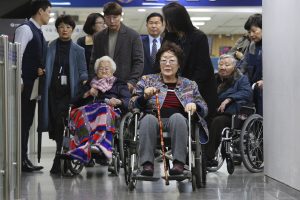The comfort women issue has emerged as the single most divisive aspect in Japan’s wartime past. One action group in South Korea, the epicenter of the issue, has played an outsized role in bringing the dispute to the forefront of international awareness. This group is The Korean Council for Justice and Remembrance for the Issues of Military Sexual Slavery by Japan (the Korean Council for Justice and Remembrance). This Council was formed through 16 groups related to women’s issues in South Korea in November 1990 as the Korean Council for the Women Drafted for Military Sexual Slavery by Japan (the Korean Council for the Women Drafted), and in 2016, it effectively merged with its affiliate, the Korean Council for Justice and Remembrance, giving the organization its current form.
Yet the Korean Council for Justice and Remembrance is now being rocked by its own internal strife. The problem began on May 7, when former comfort woman Lee Yong-soo spoke out, saying that she and other comfort women had been fooled and used by the council. Lee Yong-soo, along with Kim Bok-dong, who died in January of last year, were the most active in working with the council’s activities, among the few elderly surviving comfort women. They were, in other words, the face of the council, and consequently the response to their allegation was huge. As a result, the Korean Council for Justice and Remembrance has become the target of growing suspicions in South Korea, and the organization that until recently had driven the comfort women issue in South Korea and globally was has suffered serious damage.
What happened? In fact, it is not well known, but since the era of the Korean Council for the Women Drafted, the organization has actually had no real “members.” The official explanation is that this is because it has always been an alliance of women’s action organizations, but it is clear that in reality the council is more than a simple alliance, given that it has an office and undertook a range of activities both in South Korea and abroad under the name of the Korean Council for the Women Drafted.
In 2016, the organization became a legally incorporated foundation. This occurred when the Korean Council for the Women Drafted was incorporated into The Korean Council for Justice and Remembrance for the Issues of Military Sexual Slavery by Japan, a legally incorporated foundation that was formed under the Korean Council for the Women Drafted. This Korean Council for Justice and Remembrance was formed in opposition to the 2015* Japan-South Korea comfort women agreement, and it qualified as a legally incorporated foundation so that it could engage in independent fundraising activities. In other words, the current Korean Council for Justice and Remembrance became a foundation by merging with a council of the same name that was in effect a “subsidiary” of the “parent company,” the Korean Council for the Women Drafted.
According to the articles of association, as listed on the Korean Council for Justice and Remembrance’s own website, while this legally incorporated foundation has a governing board, it doesn’t have any members. While there are “supporters,” a status attained through donations, they are naturally not constituent members of the organization, but are no more than patrons who have no voice in the organization’s operations. In other words, this organization, despite its high domestic and international profile, is an extremely closed organization that is not open to new members.
So why has the comfort women issue, something of considerable interest to all South Koreans, been led by this closed organization? For an answer, we must go back to the 1990s, when the Korean Council for the Women Drafted, the predecessor to this organization, was formed. At the time, comfort women had yet to attract much attention, and the Korean Council for the Women Drafted was formed as an organization of a relatively small number of action groups. Because of the nature of the issue, it was difficult for the women concerned to share their own stories, and so a small number of activists campaigned on their behalf.
The Korean Council for Justice and Remembrance then inherited this “closed” approach, in contrast to one that might be called ideological and progressive. It is sometimes misunderstood, but the Korean Council for Justice and Remembrance is not an organization made up of comfort women. This Council is simply a support group. It acts as a representative for comfort women because of the difficulty of the women themselves traditionally had in speaking out.
But South Korea, and indeed the international community, has matured, and there is widespread understanding of the comfort women issue. Now, women can speak out on their own, and we are able to listen directly to what they have to say. In other words, there is no need for a few activists to lead a movement on their behalf. A movement run by people other than the former comfort women themselves will inevitably result in friction between the women and the activists who deign to speak for them. To return this movement to its original form, the rights to lead must be taken from the same number of activists and returned to those who were actually involved in the issue.
In other words, we can say that a movement that has been led by a few activists has completed its historical mission, and it is now time for it to end. Viewed in this way, the situation surrounding the Korean Council for Justice and Remembrance in the South Korea of today should also be seen as reflecting the continuing development of South Korean civil society.
Kan Kimura is a professor at Kobe University.
*The year of the agreement has been corrected.

































